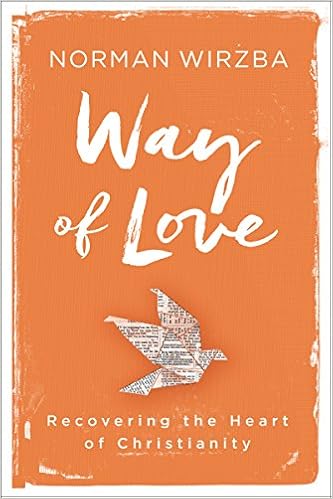
Way
of Love: Recovering the Heart of Christianity by Norman Wirzba
What is at the heart of the Christian faith, what makes
this age old faith tick? This is the
question that Professor Norman Wirzba tackles in his new book, The Way of Love: Recovering the Heart of
Christianity. Many will know Wirzba
as a Professor of Theology and Ecology at Duke University Divinity School,
while others will know him for his long forays into the intersection of
theology and the environment (Food and Faith: A Theology of Eating, 2011). This book is both a clearing of the deck of
old worn out theories describing the essence of Christianity but also paves the
way forward with a vision of Christianity that is for all of life, including
all of creation. With a healthy dose of
wisdom, clear thinking, and imagination, Wirzba plows ahead breathing new life
into the teachings of both Scripture and the faith.
Grounding the nature of Christianity as both a way of
life and an understanding of God, Wirzba writes, “Christianity reveals the life
of God and therefore also the meaning of life as a way of love (1-2). Yet,
the church has often been an obstruction in the way of love, seeking to exclude or punish others while
maintaining a safe distance from those deemed a threat. Even with a painful past, “love needs God to
expose and explode the often anxious, often self-serving desires that are love’s
pretenders (3).” Our feeble minds
dissect love into who’s in and who’s out, all the while narrowing and making
love much too small, while the coming of Jesus of Nazareth upended all these
distinctions. So how does this way of
love work and transform all those whom it touches? Wirzba writes, “Seeing Christianity as a
school or laboratory that trains people in the ways of love is the best way to
understand the work and mission of the church (7).” There is an apprenticeship in mind here, a
life-long training that discards distorted ways of love and inculcates a way of
love that embraces the other.
One of the beautiful points of the whole book is Wirzba’s
insistence that we can’t love on our own (21).
Early on he writes, “To learn to love, you have to practice with other
people who are committed to inspire you when you are tired, celebrate when you
succeed, and comfort you when you fail (21).”
The concept of a man meditating on high place or a wise person
flagellating his body does not push someone to love others well. Rather, being in community with others gives
us a vision of sacrifice, of “going to others and offering ourselves to others,
so that our life together can grow and flourish (22).” We see in this picture of the marriage
covenant, each person committing to love on another til death, through thin and
thick, but we also witness this sacrificial love in church.
Wirzba takes on the issue of sin and its effects on all
of creation with profundity and wisdom.
Looking at sin’s dysfunction interpersonally, Wirzba writes, “When people
are muddled about love, they gradually lose the sympathies to recognize each
other’s need and pain, the imagination to envision each other’s flourishing,
the commitment to work patiently with others to help them realize their
potential, and the joy that cherishes and celebrates the goodness that others
are (99).” We have corrupted the way of
love into a self-serving kind of convenience that cares not for the outside
world. And yet, “The love of God is not
like this. It is unconditional and
universal, extending to every creature and every person (106).” Norman brings together a Augustine’s
understanding of sin but also gives us a glimpse how disordered desires hinge
upon power, control and convenience. No
longer is there a giving and receiving of love, but a taking and profaning of
the other person for our own twisted ends.
The book takes a turn for the beautiful as Wirzba
recounts the story of Mark Eddy joining the small college community in
Georgetown, Kentucky. With anger,
sadness, depression for at least ten years (149), Mark needed some
healing. Standing before the
congregation in 2006, Mark tells them,
“When it became known that I was sick, I found myself
surrounded by the light of love from people who hardly knew me. My family was flooded with prayers, food,
cards, and the assurance that we were not alone and that others would be there
for us. It was though there were a
thousand arms of love reaching out to us.
And I knew that it was the presence of God. I felt that I’d been overtaken by the kingdom
of God and allowed briefly to look inside to experience just for a moment the
love and joy of Christ’s kingdom (150).”
The visible grace that was shown to Mark is what this
book is all about, making evident the rich love of God and the way of love that
is taught by God to be showered upon all creation. I hope you will read this book and be richly
encouraged by its words.
Thanks to HarperOne and Jane Chong for the copy of this
book in exchange for an honest review.
Comments
Post a Comment